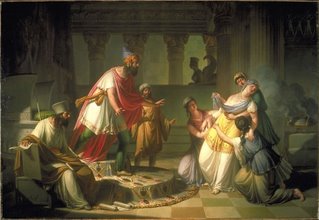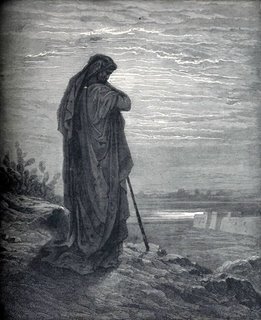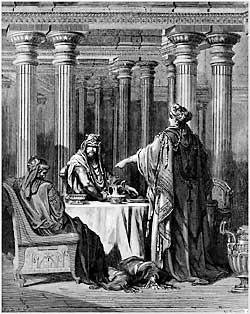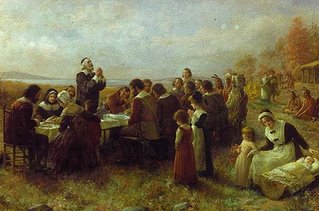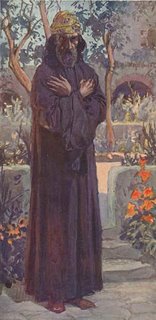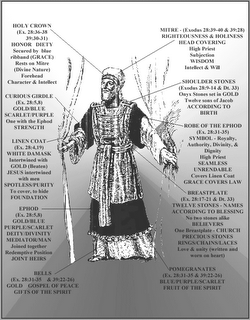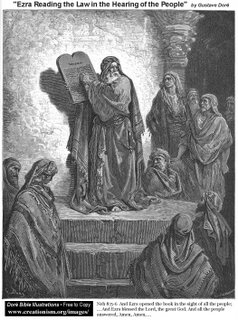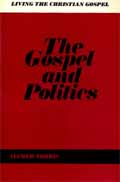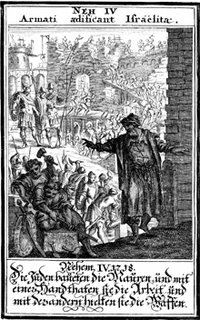 Nehemiah 4:17f
Nehemiah 4:17f. From
"Biblia ectypa : Bildnussen auss Heiliger Schrifft Alt und Neuen Testaments", Christoph Weigel (author). Call Number at Pitts Theology Library: 1695Bibl.
We know what is meant when someone says they do not want to rock the boat, or disturb the status quo; they do not want to cause trouble by making changes. Often this is a proper approach, but in the matter of our religion, this religion is so different from what is natural to us, that we must be constantly vigilant to be sure we have not settled into ways which are unproductive in the way of salvation. The times of Ezra and Nehemiah provide us with the opportunity to examine this thought.
The return of the Jewish captivity in Babylon to Jerusalem was prophesied by Isaiah and Jeremiah, and Daniel was cognisant of some of these prophecies. It would have been exciting indeed for those aware of the word of God to witness the fulfilment of these prophecies. They would have appreciated that the hand of God had not forsaken the Jews, and like ourselves in these latter days, would be able to have confidence in the covenants to Abraham, the foundation of their hope.
The way this return to Jerusalem was initiated was apparently quite natural. There was no one sent to Cyrus to demand he repatriate this people. It was quite simply a consequence of his policies, no doubt encouraged by men around him who knew of the prophecies. The scriptures state that the Lord stirred him up to do this.
"Now in the first year of Cyrus king of Persia, that the word of the LORD spoken by the mouth of Jeremiah might be accomplished, the LORD stirred up the spirit of Cyrus king of Persia, that he made a proclamation throughout all his kingdom, and put it also in writing, saying, Thus saith Cyrus king of Persia, All the kingdoms of the earth hath the LORD God of heaven given me; and he hath charged me to build him an house in Jerusalem, which is in Judah. Who is there among you of all his people? The LORD his God be with him, and let him go up." 2 Chr 36:22-23
We read therefore from the book of Ezra how this charge was executed. The chief of the people, and many others, took much wealth, gifts willingly offered, including the vessels from the original temple which were given back to them by Cyrus, and went to Jerusalem. Their leader was one Zerubbabel, who was apparently of the royal line, a descendent of the royal family deposed by Nebuchadnezzar before Jerusalem was destroyed by the king of Babylon's armies.
This crowd of Jews from Babylon, having come to Jerusalem specifically to build the temple, began by building the altar of burnt offering, and set up the services required by the Law received through Moses. They set up a fund, and made other preparations to begin building the temple itself. It is interesting to read why they set up the altar before the temple was reconstructed to receive it. Ezra 3:3 reveals this.
"And they set the altar upon his bases; for fear was upon them because of the people of those countries: and they offered burnt offerings thereon unto the LORD, even burnt offerings morning and evening." Ezra 3:3
They made the worship of God their focus because they were afraid of the people around them, who had had the place to themselves for almost a century, who we learn from the record were not at all happy about what was going on at Jerusalem. These people did not like to see the status quo disturbed. Can we pause to think about whether we would feel comfortable about making God our focus in time of difficulty?
The work on the temple progressed, and in due course the foundations were laid amid much celebration. Some of the old men there could remember the temple before the Babylonians destroyed it, and the recollection brought tears to their eyes.
The people from around, Samaritans who had been put there during earlier Assyrian campaigns, and who were not therefore natives, these people sought to join in the restoration work. They came to Zerubbabel claiming to worship the God of the Jews, and seeking to infiltrate the Jewish community, ostensibly to help in the work.
"But Zerubbabel, and Jeshua, and the rest of the chief of the fathers of Israel, said unto them, Ye have nothing to do with us to build an house unto our God; but we ourselves together will build unto the LORD God of Israel, as king Cyrus the king of Persia hath commanded us." Ezra 4:3
The rulers, appreciating the consequences of teaming up with the outsiders, wisely declined the offers of help, but this caused these people to show their true colours. They were intent not on helping, but on disrupting the progress of the building. They hired people to frustrate the Jews purpose, and sent messages to the rulers of the empire, to Cyrus, to Artaxerxes, and to Darius after him, to have the work stopped. These people succeeded. The work was temporarily stopped in the reign of Artaxerxes.
It was not in the purpose of God that the work should stop. It is interesting to note the different way God treated those who were not responsible to him, but were required to do his will, men like the kings of the nations, and those who were responsible, and whom he wished to use to accomplish his purpose, that is his people in Jerusalem. When the Jews had to go to Jerusalem from Babylon, God imposed his will upon Cyrus, and he made it possible for the people to return. Cyrus really had no choice in the matter. When the Jews, who should have known his purpose, stopped doing what he required, he did not force them to continue, or arrange circumstances so that it was most natural for them to do his righteousness, but sent prophets to remind them of their responsibilities. The Jews were required to make a conscious decision to do those things which were pleasing to God, and then follow up on that decision.
When the work ceased, the Lord sent prophets, Haggai and Zechariah, to encourage them to resume the work. God did not cause their minds to automatically want to do the work. The people were not forced to do what God required, they were encouraged, and punishment was meted out on those who did not cooperate in the will of God. The people were not relieved of their responsibilities because they no longer found it easy, because they had lost their motivation. They could not quit what they were responsible to accomplish. This was what the prophets needed to make them understand.
The work was resumed, and Ezra 5:5 is interesting for comment.
"But the eye of their God was upon the elders of the Jews, that they could not cause them to cease, till the matter came to Darius: and then they returned answer by letter concerning this matter." When the Jews resumed the Lord's work, the Lord's eye was upon them, and the work prospered, in spite of the antagonism of the people around. In fact, when the antagonists wrote to the new king, Darius, suggesting he take steps to curtail the work, he did the opposite, and made arrangements for the local taxes to be used to pay for the work! With this new incentive, and the continued effort of the Jews in the building work, the temple was finished, and dedicated.
Ezra was a priest, and he came from Babylon to Jerusalem not with Zerubbabel, but later, at about the time the prophets were encouraging the people to resume their building work. It appears that Artaxerxes rescinded his stop work order, sending with Ezra another letter to encourage the work to continue. It was an instance that when the Jews did what was right, the way was cleared for them to continue.
Ezra was sent from Babylon laden with silver and gold, with vessels for use in the temple services, and with authority to take from the kings treasuries, that is from the taxes, for use in the temple service. The responsibility given him by the king was to teach the people the law of God, and to make the colony of Jews law abiding, so that there should be no wrath upon the king Artaxerxes.
When things go well for us, when everything seems to fall into place as we had hoped, do we congratulate ourselves on a job well done? We have some cause for self satisfaction, surely, but the example of Ezra was to render back to God the credit for what was achieved. He acknowledged that it was the good hand of the Almighty, not his own strength and authority, which had accomplished his desire to beautify the temple and teach the people in Jerusalem.
"Blessed be the LORD God of our fathers, which hath put such a thing as this in the king's heart, to beautify the house of the LORD which is in Jerusalem: And hath extended mercy unto me before the king, and his counsellors, and before all the king's mighty princes. And I was strengthened as the hand of the LORD my God was upon me, and I gathered together out of Israel chief men to go up with me." Ezra 7:27-28
Ezra could appreciate that it was in the kindness of God these things were to be accomplished, an attitude we do well to foster when things go right for us.
A problem arose. How were they to get this caravan, laden with wealth, across the robber infested roads all the way from Babylon to Jerusalem? Having spoken to the King of the great confidence they had in God, they were not anxious to go back to him and say, 'Oh, by the way, our God would like you to provide a guard for his treasures!' Ezra turned to the Lord God himself for help, as he always did.
"Then I proclaimed a fast there, at the river of Ahava, that we might afflict ourselves before our God, to seek of him a right way for us, and for our little ones, and for all our substance. For I was ashamed to require of the king a band of soldiers and horsemen to help us against the enemy in the way: because we had spoken unto the king, saying, The hand of our God is upon all them for good that seek him; but his power and his wrath is against all them that forsake him. So we fasted and besought our God for this: and he was entreated of us." Ezra 8:21-23
The convoy was indeed delivered from the thieves, Ezra's faith in God was vindicated. The treasures were delivered without loss to the custodians for the temple services.
After the treasures had been delivered, the princes came to Ezra with a concern. They reported that the people had mingled with the 'outsiders', participating in their abominations, and marrying their women. Regrettably, the rulers had been foremost in this wrong. This information devastated Ezra, and it was not until the evening sacrifice he was able to regain enough composure to appeal to the Lord.
Before we think about Ezra's response to this information, what does it mean to us. How do we react to the situation? We appreciate that what the Jews were doing was not unusual in a general sense. The activities they were engaging in with the people around were quite ordinary things in that context. It would not have been like the bad guy in a social group doing his or her best to get someone else to do something everyone knew was wrong, just for the dare of it. The activities which were under discussion here were probably just the normal behaviour and activities of the people, but nevertheless things which were abhorrent and abominable to God. If we need a current example to help us to understand, we might consider bad language, particularly swearing. It is nothing accounted of today, and if we were to indulge we would not be 'shut out' of the world's society, in fact we might rather be all the more warmly welcomed by it. However, it is not approved by the Almighty, and therefore is abomination to him.
"Let your speech be alway with grace, seasoned with salt, that ye may know how ye ought to answer every man." Col 4:6
The point we are trying to drive home is that this Jewish community was merely joining in with the normal activities of the nations around. They were not becoming evil people in the popularly accepted understanding of this idea. It was this common association, which lead in many cases to actual marriage, as the differentiation between the Jews and the others became less obvious, which was so bad in the eyes of God.
From time to time we read prayers pleading for forgiveness for God's people. Here is one of them, by Ezra, recorded in Ezra 9, and there is another close by, offered by Nehemiah. Both of these prayers, and others, such as the one offered by Daniel, have an uncanny characteristic. This is illustrated in Ezra 9:6, for example.
"And said, O my God, I am ashamed and blush to lift up my face to thee, my God: for our iniquities are increased over our head, and our trespass is grown up unto the heavens." Ezra 9:6
Although he was not personally involved in the problem behaviours of his people, he accepted that he had equal responsibility with them in the matter, and this in spite of the fact he had only just arrived on the scene! Now if this was an isolated incident in scripture, this association with the guilt, we would find nothing remarkable in it. But this is not so. We find the same in the case of Nehemiah praying for his people. When Daniel prayed for his people, he too took on responsibility for the sin. Think about this: did these men simply assume this responsibility, or was it a responsibility from which they could not escape? It was a responsibility which came upon them because of their association with the group, and they could not get away from it. Although not personally involved in the sins, they were responsible by association with the group. We should come back to this idea: it is important to us today.
We do not want to get overcome by the negative aspects of the supplication Ezra made, important though they are. He recognized the principle illustrated throughout scripture, that it is by God's grace people are saved, not their righteousness! Thus it is written:
"And now for a little space grace hath been showed from the LORD our God, to leave us a remnant to escape, and to give us a nail in his holy place, that our God may lighten our eyes, and give us a little reviving in our bondage. For we were bondmen; yet our God hath not forsaken us in our bondage, but hath extended mercy unto us in the sight of the kings of Persia, to give us a reviving, to set up the house of our God, and to repair the desolations thereof, and to give us a wall in Judah and in Jerusalem." Ezra 9:8-9
Salvation is of God. From time to time we may get into despair. We may wonder if it is all worth it, if we really do have what it takes to be in the kingdom, approved of God. It is because we have forgotten that we do not get to the kingdom on our own strength, but by the grace of God. We have forgotten that it is his purpose, his strong desire that none should fall short of his grace. We know what God said to the people through Ezekiel:
"Say unto them, As I live, saith the Lord GOD, I have no pleasure in the death of the wicked; but that the wicked turn from his way and live: turn ye, turn ye from your evil ways; for why will ye die, O house of Israel?" Ezek 33:11
Let the meaning of these words sink in. God does not have pleasure in the death of the wicked. So he does not want the house of Israel, or ourselves to die, but rather to turn to him. He encourages us to turn to him, and many times gives us yet another opportunity to demonstrate that we really are trying to be obedient.
"The Lord is not slack concerning his promise, as some men count slackness; but is longsuffering to us-ward, not willing that any should perish, but that all should come to repentance." 2 Pet 3:9
It is with us as it was with them. The Lord God really wants to have us in his kingdom. This was the sole reason for creating this whole system, so that his creation could glorify him, and he gives us so many opportunities to walk with him that we should never despair, if we are truly seeking after him. This, after all, as Ezra recognized, was the reason why he had permitted them to return to Jerusalem, to build the temple again, so that once more they might turn to him.
Ezekiel mentioned it, Peter mentioned it, Ezra and his people showed what it meant to them, that repentance was required for forgiveness. The longsuffering of God does not extend to the toleration of persistent willful disobedience. In this case the decision was made to put away the wives and children who were not of Israel, who were not the 'holy seed'.
"Now therefore let us make a covenant with our God to put away all the wives, and such as are born of them, according to the counsel of my lord, and of those that tremble at the commandment of our God; and let it be done according to the law." Ezra 10:3
How far did they take this decision? Did they make room for special circumstances? Did they really mean what they said when they committed to be rid of the foreign wives and their children? They made proclamation throughout the jurisdiction:
"And that whosoever would not come within three days, according to the counsel of the princes and the elders, all his substance should be forfeited, and himself separated from the congregation of those that had been carried away." Ezra 10:8
Those who would not cooperate in cleaning up the mess would be separated from the congregation. This is a principle we have to mind today. It was not new then, but had its foundation perhaps in the call to Abraham to be separate. the call was reinforced by the Law given through Moses. Paul reminds us of the same thing, quoting in fact from Isaiah.
"Wherefore come out from among them, and be ye separate, saith the Lord, and touch not the unclean thing; and I will receive you," 2 Cor 6:17
Again from Paul:
"And have no fellowship with the unfruitful works of darkness, but rather reprove them." Eph 5:11
There can be no doubt as to our responsibilities in our lives. We are wise to avoid the influence of the world, and the best way to do this is to be separate from it, refusing to participate in its inappropriate activities. We will know what is inappropriate, and therefore where to draw the line, only when our mind is filled with the things of the spirit. Can there therefore be any doubt with what we should fill our minds, and how we should do it?
In this circumstance in Jerusalem, the matter was of such magnitude that they had to set a timetable to deal with it. It took them two months to clear it all up. It is sad really, that the last thing in the book of Ezra is a list of those who were guilty in this respect. It is a reminder that God knows whose lives are deficient before him. It is also a reminder that even when we are deficient in our service and behaviour, God is ready to forgive when we turn from our waywardness.
We have begun to read from the book of Nehemiah in the last few days. Nehemiah was somewhat of a contemporary of Ezra, but his mission was different. Ezra was a priest, and he wanted to see the temple completed, the services fully reinstated, and the people worshipping God wholeheartedly. Nehemiah heard of the difficulties of the people in the land, and resolved to improve their situation by building the wall of the city. This would enable them to prevent intrusion of the unwanted neighbours into their affairs, with all the ramifications that had. After receiving a report of the affliction and reproach suffered by his people, Nehemiah prayed before the Lord for their deliverance.
This prayer has the same characteristic to which we have already referred, that he did not exclude himself from the problems of the community, in spite of the fact he was not physically a part of it. Morally he could not be separated from the Jews in Jerusalem who were in spiritual disgrace, even though he was not physically part of the problem.
"Let thine ear now be attentive, and thine eyes open, that thou mayest hear the prayer of thy servant, which I pray before thee now, day and night, for the children of Israel thy servants, and confess the sins of the children of Israel, which we have sinned against thee: both I and my father's house have sinned." Neh 1:6
There may be a school of thought which says we should not meddle in the affairs of others. This is undoubtedly good advice in many matters, but when it comes to the things concerning the Truth, some moderation of the concept is required. As Ezra and Nehemiah, and as we have also noted Daniel, could not be separated from the affairs of their people, so we are individually responsible for the collective behaviour of our people, which means our immediate family, our ecclesia, our fellowship. Paul found it necessary to explain the same idea to the Corinthians, where he spoke of the ecclesia as being like a body in which all parts are important, and that a malfunction in one part affects the whole. He wrote:
"That there should be no schism in the body; but that the members should have the same care one for another. And whether one member suffer, all the members suffer with it; or one member be honoured, all the members rejoice with it. Now ye are the body of Christ, and members in particular." 1 Cor 12:25-27
There are therefore two parts to this situation, first that malfunction in one part affects the whole body, and second that the whole body is responsible for every other part. This gives us a twofold responsibility, first to make sure we are not the part which has the problem, and second to see that the problem of another is properly taken care of. In the cases from the Old Testament before us, and Paul's comments, the type of problem concerns behaving in an unseemly manner before God. We have responsibilities as individuals not to depart from the belief and practise of the Truth, and we have responsibilities toward those who have departed, to bring them back, or failing that, to dissociate from them as happened to those who would not leave their foreign wives. Believers must not permit those who will not be Godly to remain within the community, or to influence it in any way. To permit this is clearly to share the responsibility for the sin. None of us needs that burden.
Nehemiah's concern over the spiritual welfare of his people reflected in his attitude to his work in the palace. The King noticed this, and when he knew what was on his servant's mind, granted him a leave of absence.
"And I said unto the king, If it please the king, and if thy servant have found favour in thy sight, that thou wouldest send me unto Judah, unto the city of my fathers' sepulchres, that I may build it. And the king said unto me, (the queen also sitting by him,) For how long shall thy journey be? and when wilt thou return? So it pleased the king to send me; and I set him a time." Neh 2:5-6
Nehemiah wanted to build the city, not for purposes of insurrection, but that it might be a fortress against the wiles of the enemy. We cannot help but think about parallels with our lives. If we lived communally in the world, it would be very difficult to practise the Truth. If the community of the ecclesia is devoid of worldliness in thought and deed, it will help strengthen our resistance to the wickedness outside. In our homes, we have the ability to isolate ourselves from many untoward influences, and thus improve our spirituality. Strong fences, strong defences, are an essential asset in the struggle to serve the Lord to his glory. This is why we must be careful about the literature we allow in our homes, the radio programs we allow to influence us, and the videos and television which have even stronger ability to influence. Put up walls, do not allow the defences to be breached, and develop spirituality and righteousness within. This was the principle upon which the nation of Israel was constituted, exclusion of outside influence. The nation fell when the principle was abandoned. Nehemiah tried to bring it all together again, so the people would turn again to God.
On arriving at Jerusalem, Nehemiah made reconnaissance of the walls at night by himself. Having made plans, he discussed them with the rulers, and they strengthened themselves for this good work. The surrounding people did not approve of the plan, of course, accusing him of rebellion, and laughed in the face of Nehemiah. What was his response?
"Then answered I them, and said unto them, The God of heaven, he will prosper us; therefore we his servants will arise and build: but ye have no portion, nor right, nor memorial, in Jerusalem." Neh 2:20
Again the faithful put their trust in the Lord God. Notice too that Nehemiah was emphatic these outsiders had no place in Jerusalem. They still have no place in the hearts and bastions of God's people.
The plans were made, the work was organised. Families were assigned to rebuild and repair various parts of the wall. The responsibility was not laid upon just a few, those skilled in the practice of building. Everyone had a part in the work. Even those whose work might be considered 'delicate' were involved, for example goldsmiths and apothecaries.
"Next unto him repaired Uzziel the son of Harhaiah, of the goldsmiths. Next unto him also repaired Hananiah the son of one of the apothecaries, and they fortified Jerusalem unto the broad wall." Neh 3:8
The womenfolk were not necessarily excluded, neither were the rulers. Perhaps Shallum had no sons?
"And next unto him repaired Shallum the son of Halohesh, the ruler of the half part of Jerusalem, he and his daughters." Neh 3:12
Regrettably, some did not work enthusiastically, and doubtless they would have dampened the enthusiasm of those who were willing.
"And next unto them the Tekoites repaired; but their nobles put not their necks to the work of their Lord." Neh 3:5
By working together the job was done, a job the surrounding people did not think was possible.
Is it possible there are some jobs in the ecclesia which need to be done, but which seem to be impossible for some reason? Do we think we could take a leaf out of Nehemiah's book, get organised, and work together, regardless of our perceived suitability for the tasks which need to be done? Each family might take responsibility for a relatively small task, and work at it until it was complete, then the big job would suddenly be finished, and we would all have benefited from working together towards a common goal in the service of God. We think this is an idea worth pursuit.
Today's reading illustrates how to deal with troubles from outside the community. The nations conspired to destroy the work of God's people. They had been able to temporarily halt building progress on the Temple before, now they were rather more aggressive about it, planning not to make appeal to the King, but to do battle with the Jews. What was Nehemiah's response?
"Nevertheless we made our prayer unto our God, and set a watch against them day and night, because of them." Neh 4:9
He did not stop, but prepared to meet the armies. Nehemiah's workers were armed and prepared. When the enemy heard that this was so, they backed off and the work proceeded. Nothing was allowed to prevent God's work from being completed. It was not an easy task, and so great was their need to be prepared to meet the attack by the enemy that they did not even change their clothes, except for washing. Did we notice that when it was read? I did not.
In this work of Nehemiah we see
diligence,
preparedness,
cooperation and confidence in God. The consequence was that Jerusalem was built as a bastion against the influences of the people around. If we apply the same principles, the same endeavour, we will be able to shore up our spiritual city; our spiritual temple of holy spirit against wickedness. If we do not, what then? Can we live with that possibility? Do we need to rock the boat? Yes, and amen, we do!
As we prepare to partake of the elements today, let us consider what great responsibility we have to our heavenly Father and to our king, Jesus. May we remember Christ's sacrifice as we offer up ourselves as living sacrifices; spiritual walls and holy temples within the kingdom. May we be wholly and acceptable in their sight as is our priviledge and duty. Amen.
